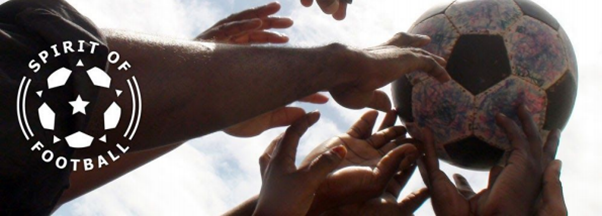 Spirit of Football (SOF) is a non-profit organisation based in the UK, Germany and Brazil, that delivers domestic and international education programmes to schools, community centres and displaced persons. Part of the curriculum focuses on the climate emergency.
Spirit of Football (SOF) is a non-profit organisation based in the UK, Germany and Brazil, that delivers domestic and international education programmes to schools, community centres and displaced persons. Part of the curriculum focuses on the climate emergency.
In addition, “The Ball” Project, started in 2002, kicks off every four years from Battersea Park on an overland journey to the football World Cup. During each specific journey, The Ball profiles a particular cause, such as people with disabilities or displaced persons. The Ball’s next journey in 2022/2023, to both the men’s and women’s World Cup (Qatar and then to New Zealand), will prioritise the climate emergency.
Why did you join the Rapid Transition Alliance?
Over the last few years, we at SOF have realised that we all need to recognise the reality of the climate emergency and speed up global action. Since 2019, SOF Germany has been delivering a climate awareness module as part of its “Fair Play Future” education programme. Knowing we could do more, and as custodians of The Ball, we recognised that the project could be an effective tool to promote action using sport.
This coincided with the June 2020 Playing Against the Clock report, written by David Goldblatt. A series of meetings followed, from which the Alliance was a natural fit for SOF to both learn from and to provide evidence-based advocacy, while looking for immediate solutions.
What for you is the biggest challenge of rapid transition?
During the last few months, while exploring the use of sport for climate action,we have noticed that there is a growing number of actors interested in supporting this approach. Many, like SOF, seem to be independently reaching similar conclusions:
- We must act now and as a global voice
- We need to articulate the message in a way, that can be easily grasped and repeated
- It all needs to feed into and influence energetic political leadership.
The immediate challenge is to try and connect as many of these actors together, as quickly as possible, to take the action to the next level.
What is your organisation doing to encourage rapid transition?
In addition to SOF Germany’s ongoing climate awareness education activities, SOF is in the process of designing The Ball’s 6th and 7th World Cup journeys, that we very much encourage people to get behind.
People often ask if we have a spare ball in case we lose the one we are carrying. “No,” we reply, “there is only One Ball and only One World, and we have to look after both of them.” In appreciation of this, “One Ball One World” will be the project title for The Ball 2022/2023.
-
- The Ball 2022/2023 Project “One Ball One World” will focus on the climate emergency and will use the unifying power of football to assist in responding to this truly One World crisis
- For the first time, The Ball will journey to both the 2022 Men’s World Cup (Qatar) and onto the 2023 Women’s World Cup (Australia/New Zealand), some 23,000+ km across 40+ countries
- This journey will demonstrate the possibilities and challenges of carbon neutral travel
- The Ball will especially target the football community: collecting climate pledges from individuals (fans), organisations (clubs) and governing bodies. It will use these commitments, supported by academic research, training and TV/Film to advocate for the change as well as deliver the message to FIFA at the opening of both tournaments
- The project will launch in 2021 in Glasgow at COP 26.
What is your favourite example of rapid transition?
My favourite example is The Montreal Protocol. As a teenager growing up in the 1980s, I remember frequent references to a growing hole in the ozone layer over the Antarctic, a protective layer around the earth. The bigger it got, the worse for all of us; it was some kind of slow-burn nuclear fallout. It was said that if nations all pulled together, we could stop it, and if consumers stopped using spray cans containing CFCs, we should be OK. We all shifted to roll-ons for underarm deodorant!
On the bigger stage, although I was not aware of it at the time, The Montreal Protocol was established in 1987 by the United Nations to protect the ozone layer. Its success can be attributed to the force of public opinion in the face of imminent danger, plus shared responsibility and solutions.
It remains the only UN treaty to achieve universal ratification.
What one thing would best help the task of rapid transition?
A collective civil society voice – the “force of public opinion in the face of imminent danger”. With its focus on politicians, who, unlike the scientists, are in the business of consensus building.
We know the problem, have the science and we have solutions. All we need now is far greater political will to accelerate action. The sports community has the tool to help drive that will – the opportunity to go to scale with just the sheer number of fans.
